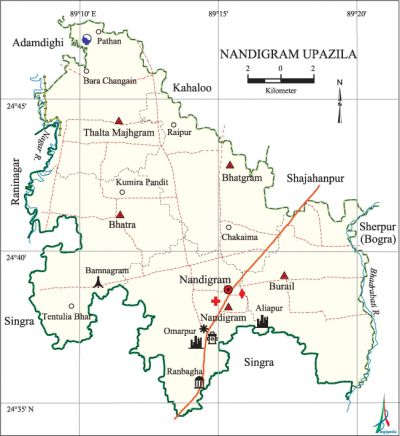Nandigram Upazila
Nandigram Upazila (bogra district) area 265.47 sq km, located in between 24°35' and 24°48' north latitudes and in between 89°08' and 89°21' east longitudes. It is bounded by shahjahanpur and kahaloo upazilas on the north, singra upazila on the south, sherpur (bogra) upazila on the east, adamdighi, raninagar and Singra upazilas on the west.
Population Total 180802; male 90408, female 90394; Muslim 158288, Hindu 22205, Christian 3 and others 306. Indigenous communities such as santal, oraon belong to this upazila.
Water bodies Main rivers: nagar, Bhadrabati.
Administration Nandigram Thana was formed in 1932 and it was turned into an upazila in 1983.
| Upazila | ||||||||
| Municipality | Union | Mouza | Village | Population | Density (per sq km) | Literacy rate (%) | ||
| Urban | Rural | Urban | Rural | |||||
| 1 | 5 | 221 | 228 | 18496 | 162306 | 682 | 56.3 | 46.5 |
| Municipality | ||||||||
| Area (sq km) |
Ward | Mahalla | Population | Density (per sq km) |
Literacy rate (%) | |||
| 19.38 | 9 | 22 | 18496 | 954 | 56.3 | |||
| Union | ||||
| Name of union and GO code | Area (acre) | Population | Literacy rate (%) | |
| Male | Female | |||
| Thalta Majhgram 84 | 12263 | 16723 | 16762 | 49.0 |
| Nandigram 73 | 8521 | 10357 | 10540 | 50.9 |
| Burail 31 | 13897 | 18661 | 18929 | 43.4 |
| Bhatgram 10 | 12658 | 18281 | 18322 | 44.3 |
| Bhatra 21 | 14524 | 16949 | 16782 | 47.3 |
Source Bangladesh Population Census 2011, Bangladesh Bureau of Statistics.

War of Liberation On 28 April 1971 the Pak army conducted mass killing at village Baman of the upazila in which 157 innocent persons were killed. In an encounter between freedom fighters and the Pak army one freedom fighter was killed. Nandigram was liberated on 8 December. There is a mass grave at Bamangram.
For details: see নন্দীগ্রাম উপজেলা, বাংলাদেশ মুক্তিযুদ্ধ জ্ঞানকোষ (Encyclopedia of Bangladesh War of Liberation), বাংলাদেশ এশিয়াটিক সোসাইটি, ঢাকা ২০২০, খণ্ড ৫।
Religious institutions Mosque 371, temple 26. Noted religious institutions: Omarpurhat Jami Mosque, Aliapukur Jami Mosque, Ranbagha Jami Mosque, Chan Mokamtala Jami Mosque.
Literacy rate and educational institutions Average literacy 47.5%; male 51.7%, female 43.4%. Educational institutions: college 10, secondary school 24, primary school 93, madrasa 19. Noted educational institutions: Kundar Hat High School (1945), Damgara Siddiquia Fazil Madrasa (1928).
Cultural organisations Club 31, cinema hall 2, cultural group 2, press club 1.
Main sources of income Agriculture 81.94%, non-agricultural labourer 1.65%, industry 0.22%, commerce 7.54%, transport and communication 1.50%, service 2.82%, construction 0.31%, religious service 0.14%, rent and remittance 0.15% and others 3.73%.
Main crops Paddy, wheat, mustard, potato, chilli, pulse, vegetables.
Main fruits Mango, jackfruit, banana, plum.
Fisheries, dairies and poultries Fishery 2, dairy 3, poultry 10.
Communication facilities Pucca road 104 km, semi-pucca road 11.41 km, mud road 216.67 km.
Extinct or nearly extinct traditional transport Palanquin, horse carriage, bullock cart.
Noted manufactories Food processing industry 70, fabricated metal works 23, printing press 1.
Cottage industries Potteries, wood work, bamboo work.
Hats, bazars and fairs Hats and bazars are 25, fairs 3, most noted of which are Nandigram Hat, Ranbagha Hat, Omarpur Hat, Kundar Hat and Baishakhi Mela at Kalyanpur.
Main exports Paddy, curd.
Access to electricity All the unions of the upazila are under rural electrification net-work. However 45.2% of the dwelling households have access to electricity.
Sources of drinking water Tube-well 97.5%, tap 0.8% and others 1.7%.
Sanitation 67.6% of dwelling households of the upazila use sanitary latrines and 22.7% of dwelling households use non-sanitary latrines; 9.7% of households do not have latrine facilities.
Health centres Upazila health centre 1, family welfare centre 2, union health centre 4. hospital 1.
NGO activities Operationally important NGOs are brac, asa, CARE, thengamara mahila sabuj sangha. [Md. Khairul Alam Pulak]
References Bangladesh Population Census 2001 and 2011, Bangladesh Bureau of Statistics; Cultural survey report of Nandigram Upazila 2007.
